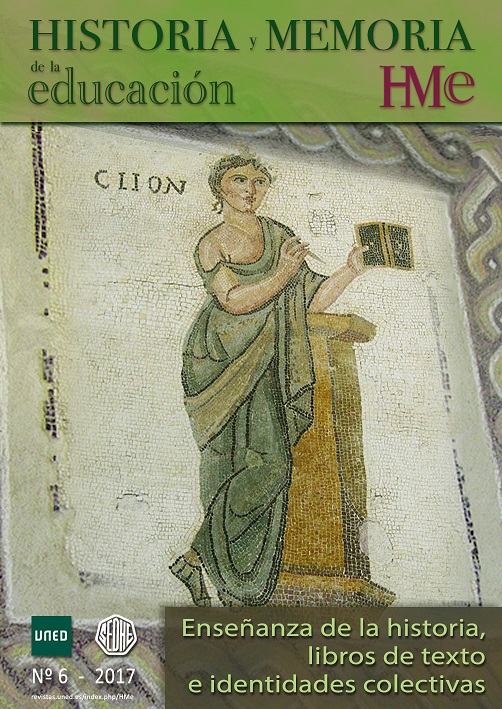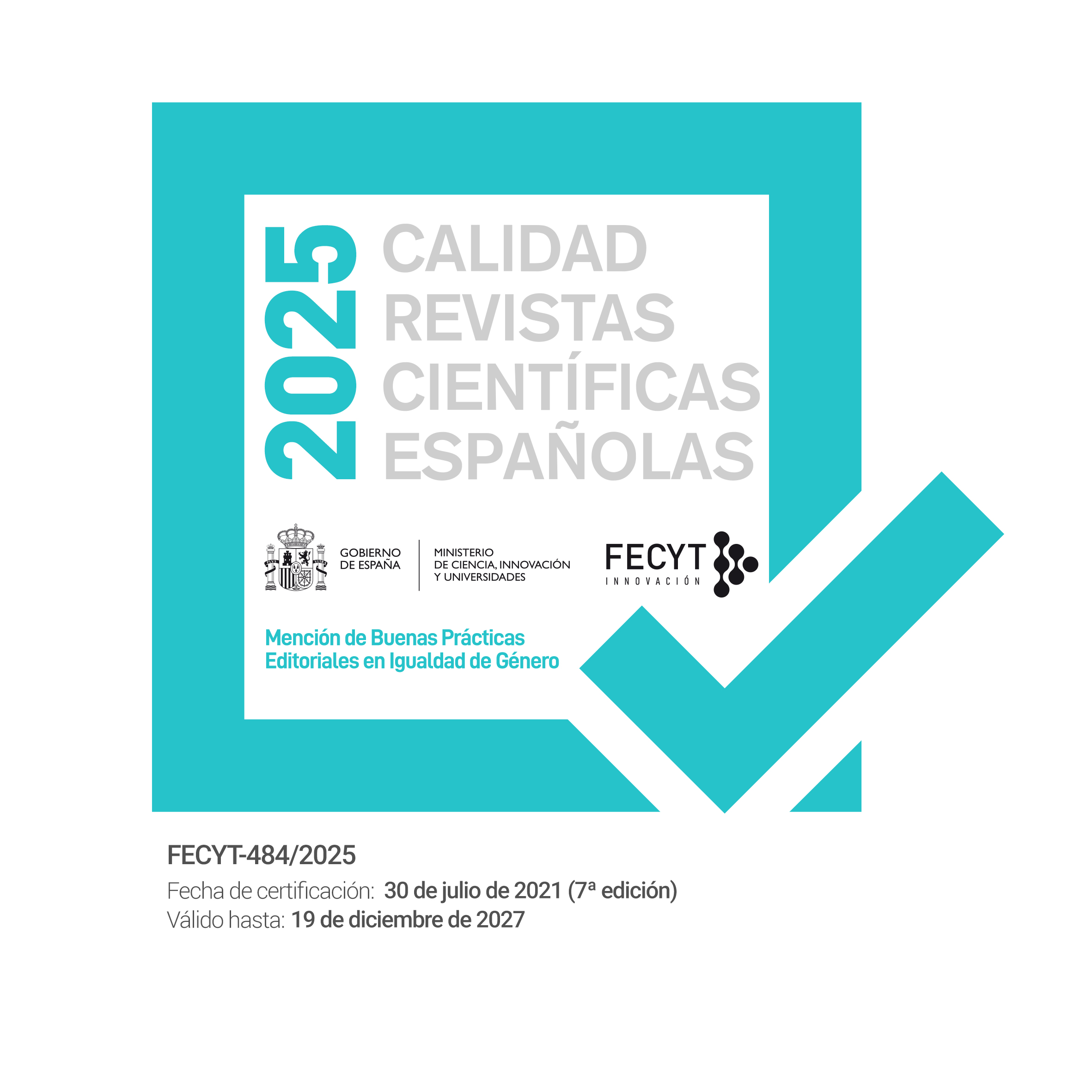Historiographical approaches and social representations in textbooks. A comparative study, Spain-France-England
DOI:
https://doi.org/10.5944/hme.6.2017.17132Keywords:
Textbooks, Historiography, History education, Social representations, Historical narrativeAbstract
This paper analyzes the historiographical approaches and national, European and extra-European social representations in Secondary Education textbooks in Spain, France and England. We have chosen for the sample 18 textbooks used in the first two years of secondary education in the three countries, and. we have selected three large, renowned publishers within each country (Anaya, Oxford and Vicens Vives for Spain; Belin, Bordas and Lelivrescolaire for France, and Collins, Heinemann and Hodder Education for England). The results show different historiographical approaches in the textbooks analyzed, with a greater pre-eminence of structuralism and positivism in the Spanish case; a clear influence of the latest generations of Annales in the French case; and a greater importance given to social history and history-from-below in the English case. The three countries also differ in social representations; French and Spanish textbooks treat historical accounts within a European framework to which they feel they belong, while the English textbooks present the construction of the English nation (especially in the Middle Ages and the Modern Age) from a very Anglo-centric perspective.
Downloads
References
Álvarez Junco, José, coord. Las historias de España. Visiones del pasado y construcción de identidad. Madrid: Crítica-Marcial Pons, 2013.
Apple, M. W., and L. K. Christian-Smith.«The Politics of theTextbook». In The Politics of the Textbook, edited by M.W. Apple and L.K. Christian-Smith, 1-21. New York: Routledge, 1991.
Apple, Michel W. Official Knowledge: Democratic Education in a Conservative Age. London: Routledge, 1993.
Ashby, Rosalyn. «Developing a concept of historical evidence: Students’ ideas about testing singular factual claims». International Journal of Historical Learning, Teaching and Research 4 (2) (2004): 44-55.
Aubin, P. «La pénétration des manuels scolaires de France au Québec. Un cas-type: Les frères des Écoles chrétiennes, XIXe-XXesiècles». Histoire de l´Edutation 85 (2000): 3-24.
Baquès, M. C. «L’évolution des manuels d’histoire du lycée. Des années 1960 aux manuels actuels». Histoire de l´Education 114 (2007): 121-149.
Barca, Isabel. «La evaluación de los aprendizajes en historia». In La evaluación y el proceso de enseñanza y aprendizaje de las ciencias sociales, edited by P. Miralles, S. Molina and A. Santisteban, 107-120. Murcia: AUPDCS, 2011.
Barca, Isabel. «Till new facts are discovered: Students’ideas about objectivity in history». In International review of history education, Vol. 4: Understanding history: Recent research in history education, edited by R. Ashby, P. Gordon and P. Lee, 68-82. New York: Routledge Falmer, 2005.
Barton, Keith C. «Applied research: Educational research as a way of seeing». In The professional teaching of history: UK and Dutch perspectives, edited by A. McCully, G. Mills, and C. van Boxtel, 1-15. Coleraine, Northern Ireland: History Teacher Education Network, 2012.
Berr, A. En marge de l'histoire universelle. París: Albin Michel, 1953.
Blanco, A. «La representación del tiempo histórico en los libros de texto de primero y segundo de la Enseñanza Secundaria Obligatoria». Enseñanza de las Ciencias Sociales. Revista de investigación 7 (2008): 77-88.
Bloch, Marc. Apología para la historia o el oficio del historiador. México: FCE, 2001.
Braudel, Fernand and Armand Colin. «Histoire et sciences sociales: La longue durée». Réseaux 5 (27) (1987): 7-37.
Burke, Peter, coord. Formas de hacer historia. Madrid: Alianza, 2003.
Cajani, L. «Italian history textbooks on the brink of the twenty-first century». In School history textbooks across cultures: International debates and perspectives, edited by J. Nicholls, 27-41Oxford: Symposium books, 2006.
Carretero, Mario, Alberto Rosa and Mª Fernanda González. «Enseñar historia en tiempos de memoria». In La enseñanza de la historia y memoria colectiva, edited by M. Carretero, A. Rosa and Mª F. González, 11-36. Buenos Aires: Editorial Paidós, 2006.
Clark, Penney. «“A Nice Little Wife to Make Thing Pleasant”: Portrayal of Women in Canadian History textbooks approved in British Columbia». McGill Journal of Education 40 (2) (2005): 241-265.
Cole, G. D H. The common people, 1746-1946. London, Routledge, 1938.
Cooper, Hilary, and Arthur Chapman. Constructing History, 11-19. Londres: Sage, 2009.
Cuenca, José María, and Isabel López. «La enseñanza del patrimonio en los libros de texto de Ciencias Sociales, Geografía e Historia para ESO». Cultura y Educación 26 (1) (2014): 1-43.
Chapman, Arthur. «Taking the perspective of the other seriously? understanding historical argument». Educar em Revista, Curitiba, Brasil 42 (2011): 95-106.
Chartier, Roger. Cultural History: Between Practices and Representations. Cornell: Cornell University Press, 1993.
Chartier, Roger. La historia o la lectura del tiempo. Madrid: Gedisa, 2007.
De Certeau, Michel. La escritura de la historia. México: Universidad Iberoamericana, 2010.
Elmersjö, H. A. «History beyond borders: Peace education, history textbooks revision, and the internacionalization of history teaching in the twentieth century». Historical Encounters. A journal of historical consciousness, historical cultures, and history education 1 (1) (2014): 62-74.
Estivalèzes, M. «Teaching About Islam in the History Curriculum and in Textbooks in France». Journal of Educational Media, Memory, and Society 7 (3) (2011): 45-60.
Foster, Stuart. «The struggle for American identity: Treatment of ethnic groups in United States history textbooks». History of Education 28 (1999): 251-279.
Foster, Stuart, and K. A. Crawford, eds., What Shall We Tell the Children? International Perspectives on School History Textbooks. Greenwich, CT: Information Age Publishing, 2006.
Foster, Stuart. «Dominant Tradition in International Textbooks Research and Revision». Educational Inquiry 2 (1) (2011): 5-20.
Foster, Stuart. «Re-thinking History Textbooks in a Globalized World». In History Education and the Construction of National Identities, edited by M. Carretero, M. Asensio and Mª Rodríguez-Moneo, 49-62. Charlotte: IAP Publishing, 2012.
Fukuoka, K. «School History Textbooks and Historical Memories in Japan: A Study of Reception». International Journal of Politics, Culture and History 24 (2011): 83-103.
Giordano, G. Twentieth-century textbook wars: A history of advocacy and opposition. New York: Peter Lang, 2003.
Gómez Cosme J., and Pedro Miralles. «Los contenidos de ciencias sociales y las capacidades cognitivas en los exámenes de tercer ciclo de Educación Primaria ¿Una evaluación en competencias?». Revista Complutense de Educación 24 (2013): 91-121.
Gómez, Cosme J. «Pensamiento histórico y contenidos disciplinares en los libros de texto. Un análisis exploratorio de la Edad Moderna en 2º de la ESO». Ensayos. Revista de la Facultad de Educación de Albacete 29 (1) (2014): 131-158.
Gómez, Cosme J., and Ana María López. «Las imágenes de los libros de texto y su función en la enseñanza de la historia. Diseño de un instrumento de análisis». Enseñanza de las Ciencias Sociales, Revista de Investigación 13 (2014): 17-29.
Gómez, Cosme J., and Pedro Miralles. «¿Pensar históricamente o memorizar el pasado? La evaluación de los contenidos históricos en la educación obligatoria en España». Revista de Estudios Sociales 52 (2015): 52-68. doi:10.7440/res52.2015.04.
Gómez, Cosme J., Jorge Ortuño and Sebastián Molina. «Aprender a pensar históricamente. Retos para la historia en el siglo XXI». Tempo e Argumento 6 (11) (2014): 1-25.
Gómez, Cosme J., Ramón Cózar and Pedro Miralles. «La enseñanza de la historia y el análisis de libros de texto. Construcción de identidades y desarrollo de competencias». Ensayos. Revista de la Facultad de Educación de Albacete 29 (1) (2014): 1-25.
Hernández Cardona, Xavier. Didáctica de las Ciencias Sociales, geografía e historia. Barcelona: Graó, 2002.
Hilton, Rodney. Conflicto de clases y crisis del feudalismo. Barcelona: Crítica, 1988.
Hill, Christopher. El mundo trastornado. El ideario popular extremista en la revolución inglesa del siglo XVI. Madrid: Siglo XXI, 1983.
Hobsbawm, Eric. Gente poco corriente. Rebelión, resistencia y jazz. Barcelona: Crítica, 1999.
Iggers, G. Historiography in the Twentieth Century: From scientific objectivity to the postmodern challenge. Middletown: Wesleyan University Press, 2005.
Kerlinger, F. N. Investigación del comportamiento. Métodos de investigación en ciencias sociales. México: McGraw-Hill, 2002.
Kizel, A. «The presentation of Germany in Israelí History Textbooks between 1948-2014». Journal of Educational Media, Memory and Society 7 (1) (2015): 94-115.
Kramer, L., and S. Maza, ed. A Companion to Western Historical Thought. Oxford: Blackwell, 2006.
Laville, Christian. «Histoire et education civique constat d’echec, propos de remediation». In Pistes didactiques et chemins d’historiens. Textes offerts à Henri Moniot, edited by Marie-Christine Baquès, Annie Bruter and Nicole Tutiaux-Guillon, 225-240. París: L’Harmattan, 2003.
Le Goff, Jacques, Roger Chartier, and Jacques Revel. La nouvelle histoire. París: PUF, 1978.
Le Goff, Jacques. Marchands et banquiers du Moyen Âge. Que sais-je?.Paris: PUF, 2001.
Le Roy, E. Montaillou, village occitan de 1294 à 1324. París: Gallimard, 1975.
Lee, Peter, and Denis Shelmit. «I just wish we could go back in the past and find out what really happened: progression in understanding about historical accounts». Teaching History 117 (2004): 25-31.
Lee, Peter, and Rosalyn Ashby. «Progression in Historical Understanding among Students ages 7-14». In Knowing, Teaching and Learning History. National and International Perspectives, edited by P. N. Stearns, Peter Seixas and Sam Wineburg, 199-222. Nueva York-Londres: New York University Press, 2000.
Lee, Peter. «Putting principles intro practice: understanding history». In How students learn: History in the classroom, edited by M. Donovan and J. Bransford, 31-77. Whasington: National Academies Press, 2005.
López Facal, R. «Nacionalismos y europeísmos en los libros de texto: identificación e identidad nacional». Clío & asociados: la historia enseñada 14 (2010): 9-33.
Martínez, Nicolás, Rafael Valls and Francisco Pineda. «El uso del libro de texto de Historia de España en Bachillerato: diez años de estudio, 1993-2003 y dos reformas (LGE-LOGSE)». Didáctica de las ciencias experimentales y sociales 23 (2009): 3-35.
Martínez, Nicolás. «El uso de los manuales escolares de historia de España. Análisis de resultados desde la propuesta de Shulman». Íber. Didáctica de las Ciencias Sociales, Geografía e Historia 70 (2012): 48-58.
Miralles, Pedro. «Las tendencias historiográficas recientes y la enseñanza de la Historia en Bachillerato». Revista de historiografía 2 (2005): 158-166.
Nicholls, J. «Methods in School Textbooks Research». International Journal of Historical Learning. Teaching and Research 3 (1) (2003): 11-26.
Paniagua, Javier. «Dejad a los políticos en la cuneta. La historia social busca su propio espacio». Íber. Didáctica de las Ciencias Sociales, Geografía e Historia 12 (1997): 25-36.
Parkes, Robert J., and Heather Sharp. «Nietzschean perspectives on representations of national history in Australian school textbooks: What should we do with Gallipoli?». Ensayos. Revista de la Facultad de Educación de Albacete 29 (1) (2014): 159-181.
Paxton, R. J. «A Deafening Silence: History Textbooks and the Students Who Read Them». Review of Educational Research 69 (3) (1999): 315-339.
Perkins, Harold. The Making of a Social Historian. London: Athena Press, 2001.
Perkins, Harold. The Structured Crowd: Essays in English Social History. London: Harvester Books, 1981.
Pingel, F. The European home: Representations of 20th century Europe in history textbooks. Strasbourg: Council of Europe, 2000.
Pingel, F. UNESCO guidebook on textbook research and textbook revision. Braunschweig: GEI/UNESCO, 2010.
Porat, D. «“It’s Not Written Here, but This is What Happened: Students’ Cultural Comprehension of Textbook Narratives on the Israeli-Arab Conflict». American Educational Research Journal 41 (2004): 963–996.
Prats, Joaquim. «Criterios para la elección del libro de texto de historia». Íber. Didáctica de las Ciencias Sociales, Geografía e Historia 70 (2012): 7-13.
Prats, Joaquim. «Hacia una definición de la investigación en Didáctica de las Ciencias Sociales». Enseñanza de las Ciencias Sociales. Revista de investigación 1 (2002).
Russen, Jörn. «El libro de texto ideal. Reflexiones en torno a los medios para guiar las clases de historia». Iber. Didáctica de las Ciencias Sociales, Geografía e Historia 12 (1997): 79-90.
Sáiz, Jorge. «Actividades de libros de texto de Historia, competencias básicas y destrezas cognitivas, una difícil relación: análisis de manuales de 1º y 2º de ESO». Revista Didáctica de las Ciencias Experimentales y Sociales 25 (2011): 37-64
Sáiz, Jorge. «Alfabetización histórica y competencias básicas en libros de texto de historia y en aprendizaje de los estudiantes». Didáctica de las Ciencias Experimentales y Sociales 27 (2013): 43-66.
Sáiz, Jorge. «El tratamiento de las competencias básicas en los actuales libros de texto de historia en secundaria. Limitaciones y propuestas de mejora». Íber. Didáctica de las Ciencias Sociales, Geografía e Historia 74 (2013): 52-61.
Sáiz, Jorge. «La Península Ibérica medieval y las identidades en los actuales libros de texto de historia de 2º ESO». Íber. Didáctica de las Ciencias Sociales, Geografía e Historia 70 (2012): 67-77.
Seixas, Peter, and Tom Morton. The Big Six Concept of Historical Thinking. Toronto: Nelson, 2013.
Stöber, G. «From textbook comparison to common textbooks? Changing patterns in international textbook revision». In History education and post-conflict reconciliation: Reconsidering joint textbook projects, edited by K. V. Korostelina and S. Lässig, 26–51. New York: Routledge, 2013.
Thompson, Edward P. Tradición, revuelta y conciencia de clase. Estudios sobre la crisis de la sociedad preindustrial. Barcelona: Crítica, 1984.
Tosh, J. The pursuit of history. Harlow: Pearson Longman, 2010.
Trepat, Cristófol A. «El tiempo en la didáctica de las ciencias sociales». In El tiempo y el espacio en la didáctica de las ciencias sociales, edited by C. A. Trepat and P. Comes, 7-22. Barcelona:
Graó, 2002.
Trevelyan, G. M. English Social History. London: Book Club Associates for Longman, 1944.
Valls, Rafael. «La Guerra Civil española y la dictadura franquista: las dificultades del tratamiento escolar de un tema potencialmente conflictivo». Enseñanza de las Ciencias Sociales. Revista de investigación 6 (2007): 61-73.
Valls, Rafael. «Las imágenes en los manuales escolares españoles de Historia, ¿ilustraciones o documentos?». Íber. Didáctica de las Ciencias Sociales, Geografía e Historia 4 (1995).
Valls, Rafael. «Los estudios sobre manuales escolares de historia y sus nuevas perspectivas». Didáctica de las Ciencias Experimentales y Sociales 15 (2001): 23-36.
Valls, Rafael. «Sobre la elección y usos de las imágenes de los manuales escolares de historia: un ejemplo español (1900-1998)». Clío y asociados. La historia enseñada 4 (1999): 77-100.
Valls, Rafael. La enseñanza de la Historia y textos escolares. Buenos Aires: Zorzal, 2008.
Wilschut A. «History at themercy of politicians and ideologies:
Germany, England, and the Netherlands in the 19th and 20th centuries». Journal of Curriculum Studies 42 (5) (2011): 693-723.
Zachos, D., and A. Michailidou. «“Others” in Textbooks: The Case of Greek Sixth Grade’s History Textbook». Theory in Action 7 (3): 1-25. doi:10.3798/tia.1937-0237.14016.
Downloads
Published
How to Cite
Issue
Section
License
Authors who publish in Historia y Memoria de la Educación agree to the following terms:
- Authors retain copyright and grant the journal right of first publication with the work simultaneously licensed under a Creative Commons Attribution-NonCommercial 4.0 International that allows others to share the work with an acknowledgement of the work's authorship and initial publication in this journal.
- Authors are able to enter into separate, additional contractual arrangements for the non-exclusive distribution of the journal's published version of the work (e.g., post it to an institutional repository or publish it in a book), with an acknowledgement of its initial publication in this journal.
- Authors are permitted and encouraged to post their work online (e.g., in institutional repositories or on their website) prior to and during the submission process, as it can lead to productive exchanges, as well as earlier and greater citation of published work (See The Effect of Open Access).












